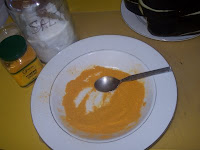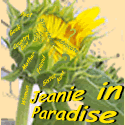Today would have been P.'s 47th birthday.
P. was 'Salina's dad. It is nearly 10 years since I met him at Cafe Bohemia. He asked me if I played chess. We played backgammon. He sang me a song and played his guitar for me. A week later I invited him to a party at the sharehouse where I lived - two flatmates were having a birthday and I was catering. He washed up and I fell in love.
He was a gentle soul, generous and kind. he was also a little offbeat, walking out of stride with the world in a lot of ways. People didn't always warm to him, he could make them uncomfortable. He never dabbled in small talk.
We were together for just over 2 years. During that time, I got to know his gentle nature and beauty - and also a few of the demons that tormented him - and they weren't ALL his family members (boom boom).
He came from a poster family for dysfunctionality - combine domestic violence, Yugoslavia, civil war, refugee status, drugs, alcohol and gambling, mix it all together and you might get an idea of what they were like in the enclave. Of course, from the outside they presented really well.
He died less than a year after we split up. By that time his mental health was very much a factor of who he was - perhaps it has always been, but it became his face.
But I don't want to dwell on that aspect of him - for it was only an aspect.
Baka always referred to her second son as "Zlatni" - her golden boy. He was the quiet brother, the one who would analyse things and try to work out the best way for things to be solved. He was a thinker and a dreamer - his dreams were of helping people, first as a nurse - and when that dream was taken from him, he settled on being a bus driver.
He was also obstinate - if he wanted you to look at his point of view or try something he had discovered, he would wear you down until you agreed to do so. 'Salina has a fair dash of that in her.
He would literally give his last dollar to anyone who needed it if asked. He was patient and willing to listen to anyones problems.
He would not jump in and offer solutions, which is both a blessing and a curse.
It is hard when you have mourned for a lost love, because part of getting over the heartbreak of all the dreams you had together not being realiseable is highlighting all the reasons why he is not wonderful to make the reality stronger.
However, since his death I have had to resurrect the things about him that were his points of quality so that 'Salina can understand who he was and how much he loved her.
So - who was P.?
P. was born in Sydney in 1961 - the second son of a violent man (Stjep) and a timid woman (Baka).
They had met in a refugee camp across the water from Yugoslavia in 1959. Originally Baka had intentions of migrating to Canada for a new life - but Stjep persuaded her to marry him and migrate to Australia, where the Snowy Moutain Scheme was crying out for workers.
She had second thoughts about marriage - he had beaten her even before that step - but she was smitten and she was devout - an ideal combination for the life ahead of her. She also came from a household where it was perfectly normal for the man to beat the woman and was able to justify it to herself - after all, it probably was her fault that she smiled and another man noticed.
She was pregnant on the ship to Australia. She had her first son within months of arrival. Fourteen months later, she had two.
Stjep's brother, also working on the scheme, was in an accident and received some compensation. The brothers decided that the money would stretch further back in Yugoslavia and moved the family back. P. was 3 when they returned - and Baka was pregnant with her 3rd son.
Stjep was violent not only with his wife (and I have heard a few of the "incidents") but with his children also. P. avoided a fair bit of stick due to a head injury he received at the hands of his elder brother resulting in epilepsy. Lucky him.
(Hmm, sound like a formula for his mental illness in the future - head injury, Eastern European medication...)
Baka's "Zlatni" was quiet and always helpful. She needed a helper - her oldest son was a schemer and violent, her third son was artistic and never home, her fourth son was a talker - in or out of trouble he would talk. She also finally had a daughter - 5 children in 14 years.
Stjep was a mover and shaker - he built a business, first using the money from his brother's payout to create a trucking business, then he branched into building, restaurants and resorts. He became rather wealthy - considering Yugoslav socialism at the time, he knew the right people and treated them well at his establishments. Despite his violent nature, he can be a very charming person, when he wants you to be charmed.
Stjep decided, when P. was 18, that his empire should expand back to Australia. As the older two were born in Australia he sent them back as his emmisaries. The older boy was built in the mould of the father - he put the spirit distributers offside by trying to scam them. P., unfortunately was never cut out to be a nightclub manager and mourned his chance at following his dream of nursing.
At the outbreak of the troubles in Yugoslavia, Stjep bought provisions for his wife and three young children, left money with his brother to dole out to his wife and came to Australia to find out what was going wrong - and found one brother with his hand in the till and the other emotionally distraught.
P. then drifted, and he had a breakdown in North Queensland (where that is not an uncommon experience) before being "saved" by the Krishnas - literally. They fed him and housed him while he recovered.
He spent time in both Croatia and Australia.
He began to study science. His father offered money for his son to return to be set up in business. Then when his father "volunteered" him for the local militia, he "borrowed" $1000 and flew back to Australia.
He worked double and triple shifts as a cabbie to help his mother and three younger siblings get refuge in Australia. One brother was stuck in Goa for over a year while the Australian government quibbled - after all, he had been deported from several countries during his vagabond years. Finally they discovered that, oops, he actually had citizenship, having been registered with an embassy while his parents were still technically Aussies.
The father offered more money for P. to return to be set up in business. He returned, married a woman after a whirlwind courtship (6 weeks) - who, he discovered 2 weeks after the wedding, had a 10 year old daughter - it was a pretty doomed arrangement. Back to Australia.
Then we met. The rest, as they say, is history.
I do wish we had made it - but we didn't. I wish that he had not got sick - but he did. I wish that he had not died.
However - I am glad for the legacy that he did leave me - a beautiful daughter and some lovely memories.
When I first met V, I was very happy that a lot of the qualities I loved about P. existed in V also.
I think they would have appreciated each other, and sometimes I am fairly sure that if P. had the opportunity to look upon our family now, he would be happy.
I hope, if he does exist on another plain, that he has attained the quiet joy he deserved.






































